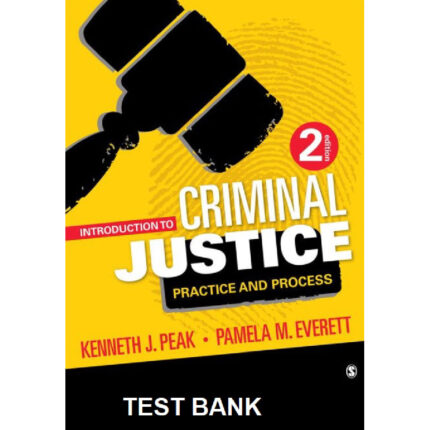Chapter 11
DISCLOSING AND SUPPRESSING EVIDENCE
TEST BANK
MULTIPLE CHOICE
1. The U.S. Supreme Court’s ruling in Brady v. Maryland prevents the suppression of what type of evidence?
a. Incriminating c. Exculpatory
b. Exclamatory d. Confessions
ANS: C REF: 278 OBJ: 3
2. Some states require the defense to file a notice if this type of evidence will be used.
a. evidence for an alibi defense c. exculpatory evidence
b. none of these answers is correct d. lab reports
ANS: A REF: 281 OBJ: 3
3. Which of the following actors would be in favor of broader discovery laws?
a. prosecutors c. defense attorney
b. judges d. police officers
ANS: C REF: 281 OBJ: 1
4. The informal and formal exchange of information between the prosecutor and the defense attorney prior to trial is called what?
a. reciprocity c. discovery
b. prosecutorial disclosure d. Brady exchange
ANS: C REF: 281 OBJ: 1
5. What types of evidence must always be turned over by the prosecutor to the defense in virtually all jurisdictions?
a. all open files of any type
b. all exculpatory evidence and all impeachment evidence
c. all witness statements
d. all statements made by the defendant
ANS: B REF: 278 OBJ: 3
6. Discovery rules are vitally important to
a. prosecutors c. judges
b. defense attorneys d. juries
ANS: B REF: 279 OBJ: 1
7. Discovery in federal cases is governed by sections of Rules covered in the Federal Rules of Criminal Procedure. Collectively, these Rules provide a defendant, upon motion, rights to discovery concerning what types of evidence?
a. books, papers, and documents, including written or recorded statements made by defendants or witnesses.
b. the results or reports of forensic tests.
c. summaries of expert testimony that the government intends to offer.
d. These rules provide a defendant right to discovery of all of these types of evidence.
ANS: D REF: 277 OBJ: 3
8. In Giglio v. United States (1972) the Supreme Court mandated that the prosecution disclose any and all information that may be used to impeach the credibility of prosecution witnesses, including law enforcement officers. This information includes
a. the prior criminal record of the witness.
b. whether the witness was offered a promise of leniency or immunity in exchange for his/her testimony.
c. any acts of misconduct by the witness.
d. All of this information is included.
ANS: D REF: 279 OBJ: 3
9. Informal prosecutorial disclosure stems from
a. a long-held courthouse theory that an advance glimpse at the prosecutor’s case encourages a plea of guilty.
b. sympathy for the defendant.
c. fear of lawsuits.
d. fear of losing a case.
ANS: A REF: 281 OBJ: 2
10. Closed discovery encourages
a. plea-bargains.
b. jury trials.
c. trials without a jury.
d. guilty pleas.
ANS: C REF: 281 OBJ: 2
11. What is the name of automatic discovery for certain types of evidence, without the necessity for motions and court orders?
a. reciprocal disclosure.
b. informal disclosure.
c. formal disclosure.
d. imperfect disclosure.
ANS: A REF: 281 OBJ: 2













Reviews
There are no reviews yet.